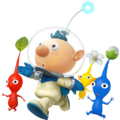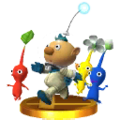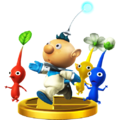| Welcome to SmashWiki! Log in or create an account and join the community, and don't forget to read this first! |
| Notices |
|---|
| The Skill parameter has been removed from Smasher infoboxes, and in its place are the new "Best historical ranking" and "Best tournament result" parameters. SmashWiki needs help adding these new parameters to Smasher infoboxes, refer to the guidelines here for what should be included in these new parameters. |
| When adding results to Smasher pages, include each tournament's entrant number in addition to the player's placement, and use the {{Trn}} template with the matching game specified. Please also fix old results on Smasher pages that do not abide to this standard. Refer to our Smasher article guidelines to see how results tables should be formatted. |
| Check out our project page for ongoing projects that SmashWiki needs help with. |
Alph
| Alph | |
|---|---|
File:Alph.png
Official artwork of Alph from Pikmin 3. | |
| Universe | Pikmin |
| Debut | Pikmin 3 (2013) |
| Smash Bros. appearances | SSB4 Ultimate |
| Most recent non-Smash appearance | Pikmin 3 (2013) |
| Console/platform of origin | Wii U |
| Species | Koppaite |
| Gender | Male |
| Place of origin | Koppai |
| Article on Pikipedia | Alph |
Alph (アルフ, Alph) is the first of the three protagonists of Pikmin 3. He was the engineer on the S.S. Drake as well as the youngest crew member. After getting stranded on PNF-404, the world of Pikmin, it fell to him to reunite the crew, get the fruit they were sent to obtain and repair the ship's warp drive. The crew end up running into and saving Olimar in the end.
History
In Pikmin 3, a group of three, consisting of Alph, Brittany and Charlie, are tasked with saving their home planet of Koppai as their food supplies become near depleted. When data collected reveals that a distant planet, given the name PNF-404 (which also happens to be the home planet of the Pikmin), is rich with a variety of fruits whose seeds can be cultivated on Koppai to end the food shortage, the crew of three travel to the alien planet in the S.S. Drake. However, their ship malfunctions and they become separated just before landing, with the cosmic-drive key also being lost, which is mandatory for leaving the planet. Over the course of the game, Alph reunites with Brittany and Charlie, collects fruit, harvesting their seeds and using their juice for sustenance while on the planet, and eventually meet up with Louie, and later on Olimar, who they rescue from the Plasm Wraith. As thanks, Olimar gives them their lost cosmic-drive key, allowing them to return to Koppai safely with their findings.
In Super Smash Bros. 4
Four of Olimar's alternate costumes replace his model with Alph, making him an alternate form of a playable character. He has his own alternate palettes as well, having ones resembling his crewmates Brittany and Captain Charlie, and his third alternate palette resembling Olimar. Despite using a different spaceship, the S.S. Drake, in Pikmin 3, Alph still uses Olimar's Hocotate Ship for his on-screen appearance and Final Smash. He has a trophy using his playable model, classified under the fighters category. However, it is obtained in the Trophy Shop instead of as a reward for clearing Classic Mode, similarly to the Koopalings.
According to translated design documents, Alph was planned to be included as a clone alongside Lucina, Dr. Mario, and Dark Pit, instead of just being an alternate costume for Olimar. Rock Pikmin were additionally planned to be included, where they would be heavy and short-ranged, but very powerful, similarly to Purple Pikmin. However, neither idea ended up implemented in the final release, presumably because of time constraints.[1]
Trophy description
Alph is a young explorer who crashed on the planet PNF-404. As the engineer of the S.S. Drake, he feels responsible for finding the missing crew and the ship after the crash. Waking up in a pond, Alph quickly encounters a tiny creature— it's a Pikmin!
A member of the crew that crash-landed on PNF-404. This young engineer is separated from the rest of his team during landing, but as an engineer, he's just as worried about their ship, the SS Drake. While looking for his crewmates and ship, Alph encounters some strange yet helpful little creatures...
: Pikmin 3 (08/2013)
In Super Smash Bros. Ultimate
Alph is confirmed to return in Super Smash Bros. Ultimate as a playable character, most likely reprising his role from Super Smash Bros. 4 as being accessible via Captain Olimar's alternate costumes.
Gallery
Alph and Olimar on Garden of Hope.
Trophy in Super Smash Bros. for Nintendo 3DS.
Trophy in Super Smash Bros. for Wii U.
Trivia
- Alph is the only playable character in Super Smash Bros. 4 whose console of origin was the Wii U.
- He and The Inkling are currently the only characters are the only playable characters who’s console of origin is the Wii U.
- Not only that, but they are both from Post-Apocalyptic series.
- He and The Inkling are currently the only characters are the only playable characters who’s console of origin is the Wii U.
References
| show Playable characters |
|---|
| show
|
|---|




